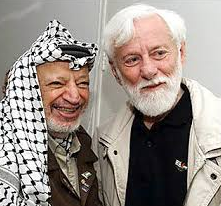
Israel’s best know leftist and peace activist, Uri Avnery, has died aged 94. His relationship with Israel’s Mizrahim was a rocky one. Some would say it was a love-hate relationship.
Uri Avnery was the first Israeli to meet Yasser Arafat, the Palestinian leader
In 1976 he was even sued by a Sephardi group.
Yet he claimed to fight discrimination against Mizrahim. His newspaper Haolam Hazeh was one of the first media outlets to raise the issue of discrimination against new immigrants from Arab countries. He wrote:
“Then came the riots in Haifas Wadi Salib neighborhood, after a policeman killed a Mizrahi man. HaOlam HaZeh was the only Israeli publication to side with the protesters. A few years later, a group of young people in Jerusalem started a protest movement, appropriating the American name Black Panthers. I supported the group. Golda Meir famously pronounced them not nice people.”
Avnery’s opposition to discrimination began in 1948. “During my military service, in the 1948 War of Independence, I was promoted to the lofty rank of squad commander. I had to choose between new immigrants from Poland or from Morocco. I chose the Moroccans, and they saved my life: As I lay wounded, exposed to the enemy, four of them risked their own lives to rescue me under fire.
But Avnery ended his life ‘angry’ with the Mizrahim. He pronouced the rift between Ashkenazim and Mizrahim the most salient in Israeli society, more than the difference between Jews and Arabs, rich and poor, men and women or right and left:
“The Mizrahi-Ashkenazi conflict dominates many aspects of our lives, but people generally don’t like talking about it openly. For example, the great majority of Likud voters are Mizrahim, although the party leaders are Ashkenazi. The Labor Party, in contrast, is almost entirely Ashkenazi. It recently chose a Mizrahi leader, in the vain hope that this will change Mizrahi attitudes to it.”
He believed that mixed marriages – Ashkardim, he called them – would solve the rift. Instead, every such family joins one of the two communities.
His anger arose out of a fundamental misunderstanding of the Mizrahim.
Mesmerised by the myth of the Golden Age, Avinery never understood that Mizrahim were driven to vote for the right because of their bitter experience of Arab and Muslim antisemitism. Point of No Return pointed to the fallacies in his worldview here.
He was in many ways typical of Ashkenazi leftists, contemptuous of the rights of Mizrahim, and leap-frogging over the memory of their persecution in Arab lands, while embracing the Palestinian ‘narrative’ and the justice of the Arab cause.

Leave a Reply